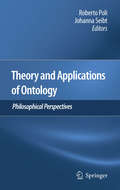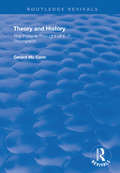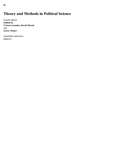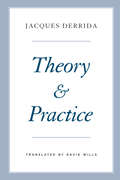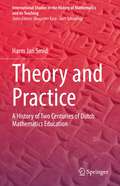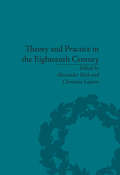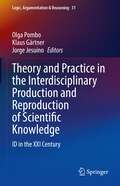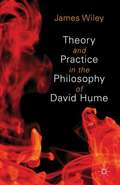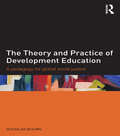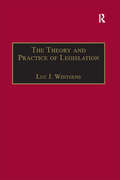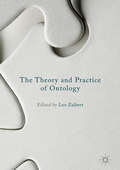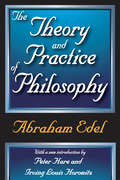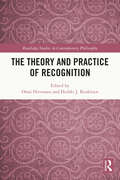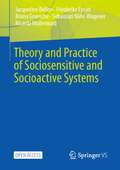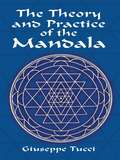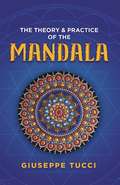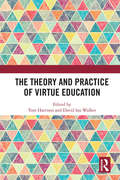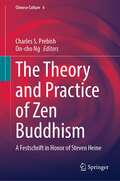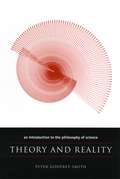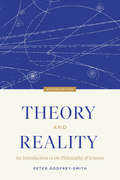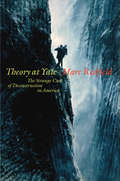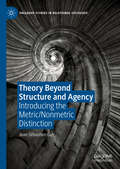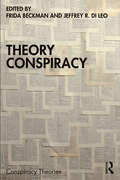- Table View
- List View
Theory and Applications of Ontology: Philosophical Perspectives
by Roberto Poli Johanna SeibtOntology was once understood to be the philosophical inquiry into the structure of reality: the analysis and categorization of 'what there is'. Recently, however, a field called 'ontology' has become part of the rapidly growing research industry in information technology. The two fields have more in common than just their name. Theory and Applications of Ontology is a two-volume anthology that aims to further an informed discussion about the relationship between ontology in philosophy and ontology in information technology. It fills an important lacuna in cutting-edge research on ontology in both fields, supplying stage-setting overview articles on history and method, presenting directions of current research in either field, and highlighting areas of productive interdisciplinary contact. Theory and Applications of Ontology: Philosophical Perspectives presents ontology in philosophy in ways that computer scientists are not likely to find elsewhere. The volume offers an overview of current research traditions in ontology, contrasting analytical, phenomenological, and hermeneutic approaches. It introduces the reader to current philosophical research on those categories of everyday and scientific reasoning that are most relevant to present and future research in information technology.
Theory and History: The Political Thought of E.P. Thompson (Routledge Revivals)
by Gerard McCannFirst published in 1997, the aim of this book is to look at the historical materialism of E.P. Thompson while introducing him as a political thinker of distinction. The study examines many aspects of Thompson’s life and work to give a comprehensive statement on his theory of historical change. It surveys the intellectual background from which he emerged; the core values of socialist humanism as understood by his generation of the Left; his contribution to history from below; his critique of structuralist Marxism; and his practical input to political dissent. The scope of this study covers fifty years of socialist polemics and offers an insight into the battles which were fought out between the old and new Left until the collapse of command-economy communism in 1989. Throughout the work of Thompson is presented as a testimony to a lineage of social thinkers as well as to the ideal of the common weal much cherished by radical practitioners of the past.
Theory And Methods In Political Science (Political Analysis Ser. #21)
by Vivien Lowndes David Marsh Gerry StokerA broad-ranging and pluralistic textbook which highlights the rich variety of approaches to studying politics. Written by an international team of experts, this fully revised fourth edition offers cutting-edge coverage from fundamental to contemporary issues. Integrating guides to further reading and clear examples of how research methods can be applied, it enables readers to feel confident about taking their study of politics forward.
Theory and Practice: Theory And Practice (The Seminars of Jacques Derrida)
by Peggy Kamuf Geoffrey Bennington Jacques DerridaTheory and Practice is a series of nine lectures that Jacques Derrida delivered at the École Normale Supérieure in 1976 and 1977. The topic of “theory and practice” was associated above all with Marxist discourse and particularly the influential interpretation of Marx by Louis Althusser. Derrida’s many questions to Althusser and other thinkers aim at unsettling the distinction between thinking and acting. Derrida’s investigations set out from Marx’s “Theses on Feuerbach,” in particular the eleventh thesis, which has often been taken as a mantra for the “end of philosophy,” to be brought about by Marxist practice. Derrida argues, however, that Althusser has no such end in view and that his discourse remains resolutely philosophical, even as it promotes the theory/practice pair as primary values. This seminar also draws fascinating connections between Marxist thought and Heidegger and features Derrida’s signature reconsideration of the dichotomy between doing and thinking. This text, available for the first time in English, shows that Derrida was doing important work on Marx long before Specters of Marx. As with the other volumes in this series, it gives readers an unparalleled glimpse into Derrida’s thinking at its best—spontaneous, unpredictable, and groundbreaking.
Theory and Practice: A History of Two Centuries of Dutch Mathematics Education (International Studies in the History of Mathematics and its Teaching)
by Harm Jan SmidThis book describes and analyses the history of Dutch mathematics education from the point of view of the changing motivations behind the teaching of mathematics over a 200 year period. During the course of the 19th century, mathematics in the Netherlands developed from a topic for practitioners into a school topic that was taught to almost all pupils of secondary education. As mathematics teaching gradually lost its practical orientation and became more and more motivated on the basis of its supposed formative value, the HBS (Hogere Burgerschool), the Dutch variant of the German Realschule, became the dominant school of thought for mathematics pedagogy. This book examines the gradual development of the field, culminating in the country-wide adoption of Realistic Mathematics Education as the new method of mathematics teaching. This book is important for anyone who is interested in the history of mathematics education. It provides an interesting perspective on the development of mathematics education in a country that, in many aspects, went its own way.
Theory and Practice in Aristotle's Natural Science
by David EbreyAristotle argued that in theory one could acquire knowledge of the natural world. But he did not stop there; he put his theories into practice. This volume of new essays shows how Aristotle's natural science and philosophical theories shed light on one another. The contributors engage with both biological and non-biological scientific works and with a wide variety of theoretical works, including Physics, Generation and Corruption, On the Soul, and Posterior Analytics. The essays focus on a number of themes, including the sort of explanation provided by matter; the relationship between matter, teleology, and necessity; cosmic teleology; how an organism's soul and faculties relate to its end; how to define things such as sleep, void, and soul; and the proper way to make scientific judgments. The resulting volume offers a rich and integrated view of Aristotle's science and shows how it fits with his larger philosophical theories.
Theory and Practice in the Eighteenth Century: Writing Between Philosophy and Literature
by Alexander Dick Christina LuptonBrings together scholars who use literary interpretation and discourse analysis to read 18th-century British philosophy in its historical context. This work analyses how the philosophers of the Enlightenment viewed their writing; and, how their institutional positions as teachers and writers influenced their understanding of human consciousness.
Theory and Practice in the Interdisciplinary Production and Reproduction of Scientific Knowledge: ID in the XXI Century (Logic, Argumentation & Reasoning #31)
by Olga Pombo Klaus Gärtner Jorge JesuínoThis book addresses the urgent need for a large and systematic analysis of current interdisciplinary (ID) research and practice. It demonstrates how ID is essentially a cognitive phenomenon, something different from the frivolous and inconsequential attempt of trying to overcome the disciplinary competencies and exigencies. By ID, the authors show that it is a manifestation of the transversal rationality that underlies current scientific activity. It is the very progress of specialized disciplines that requires interdisciplinary new research practices and new forms of articulation between domains, something that has a strong impact on the traditional disciplinary structure of scientific and educational institutions. Divided into two parts, the book presents a conceptual framework as well as several case studies on ID practices. The book aims at covering three main themes. It contributes to the stabilization of ID meaning and characterizes the main ID theorizations which have been proposed until now. It builds an innovative and broad understanding of the several ID determinations as an essentially cognitive phenomenon and of its institutional implications at the level of disciplinary structures and curricular organization. Finally, it distinguishes and maps the diversity of ID procedures and practices which are being used and tested by contemporary scientific and educational institutions. This book is addressed to philosophers, scientists and every one interested in science production and reproduction, including science teaching.
Theory and Practice in the Philosophy of David Hume
by James WileyAn original interpretation of Hume's philosophy as centered on the relationship between theory and practice. The author argues that Hume's Essays and History represent a humanist practical philosophy derived from the speculative philosophy of A Treatise of Human Nature and the Enquiries .
The Theory and Practice of Development Education: A pedagogy for global social justice
by Douglas BournDevelopment education is much more than learning about development; it is a pedagogy for the globalised societies of the twenty-first century that incorporates discourses from critical pedagogy and postcolonialism, and a mechanism for ensuring that differing perspectives are reflected within education, particularly those from developing countries. Learning about development and global issues is now part of the school curriculum in a number of countries, and terms such as global citizenship, sustainable development and cultural understanding are commonplace in many educational contexts. Development education has been recognised as one of the educational discourses that has influenced the acceptance of these terms, for both policy-makers and practitioners. This ground-breaking volume addresses the history, theoretical influences, practices and impact of development education in Europe, North America, Australia and Japan. Chapters include how development education evolved, the influence of theorists such as Paulo Freire, the practices of aid and development agencies, and the impact of governments seeking evidence of public understanding of and engagement with development. The Theory and Practice of Development Education provides essential reading for anyone engaged in re-thinking and reflecting upon the educational needs of a globalised society, and seeking approaches towards learning that place social justice at the heart of that practice. It will be of particular interest to academics and postgraduate students in the fields of development education, international education and globalisation.
The Theory and Practice of Legislation: Essays in Legisprudence (Applied Legal Philosophy)
by Luc J. WintgensThis work provides a rational framework for legislation. The unifying premise behind the essays is that, although legislation and regulation are the result of a political process, legislation and regulation can be the object of theoretical study. The volume focuses on problems that are common to most European legal systems and the approach involves applying to legislative problems the tools of legal theory - hence 'legisprudence'. Whereas traditional legal theory deals predominantly with the application of law by the judge, legisprudence enlarges the field of study so as to include the creation of law by the legislator. The original essays published in this collection expose and develop a range of new insights into the relationship between legislative problems and legal theory in a way which will engage and interest legal scholars throughout the world.
The Theory and Practice of Ontology
by Leo ZaibertThis book provides close examination of ontology and the work of Professor Barry Smith, one of the most prolific philosophers of the modern day. In this book numerous scholars who have collaborated with Smith explore the various disciplines in which the impact of his work has been felt over the breadth of his career, including biology, computer science and informatics, cognitive science, economics, genetics, geography, law, neurology, and philosophy itself. While offering in-depth perspectives on ontology, the book also expands upon the breadth of Smith's influence. With insights from renowned and influential scholars from many different countries, this book is an informative and enlightening celebration of all Smith has contributed to numerous academic schools of thought.
The Theory and Practice of Philosophy
by Abraham EdelThere is an historical element throughout philosophy. As Edel notes, this is always in the context of problems, so emphasis will fall on the major objective of reflective analysis of ideas. The major objective of Edel's analysis in The Theory and Practice of Philosophy is the fundamental interrelatedness of problems of method, metaphysics, and value. Each part is an integral whole, complete in itself.That philosophy has this central role in human practice indicates that it should be neither discarded nor deified. This is the explicit premise of the book. Students are likely to be faced increasingly with a demand for clarification on the fundamental issues of life and value. The expectation that philosophy will provide ready-made answers to these kinds of questions is as naive as the demand for any panacea, but this task cannot be turned over to any other department of human knowledge or any other branch of social activity.By placing emphasis on the importance of theory in matters of practice, the need for clear and systematic understanding of the world and man within it, and on the constant role of reflection in the management of human affairs, Edel seeks to shed light on the larger questions of philosophy by examining them in a systematic way. The result is a great text and tool for students and teachers that deals directly with the fundamental issues of our civilization.
The Theory and Practice of Recognition (Routledge Studies in Contemporary Philosophy)
by Onni Hirvonen Heikki J. KoskinenThis volume presents new essays on the theory and practice of recognition. In order to retain its overall plausibility as a critical social theory, contemporary recognition theory needs to be able to successfully combine theory with real-life perspectives, in both contemporary and historical contexts. Contemporary recognition theory has developed into an established and active multidisciplinary research programme. The chapters in this volume have two main purposes. First, they engage in theoretical development of the contemporary theories of recognition. They explore the conceptual histories and the environments of recognition, as well as the connection between recognition and authenticity, emancipation, and social ontology. Second, they connect the theoretical insights of contemporary recognition with analyses of contemporary and historical social practices. These contributions explore themes such as populism and polarization, models of harmful invisibilization and social ignorance, the problem of evil and suffering, and social justice phenomena such as the #MeToo movement. The Theory and Practice of Recognition will be of interest to scholars and advanced students working in social and political philosophy, social ontology, political theory, and sociology.
The Theory and Practice of Recognition (Routledge Studies in Contemporary Philosophy)
by Onni Hirvonen Heikki J. KoskinenThis volume presents new essays on the theory and practice of recognition. In order to retain its overall plausibility as a critical social theory, contemporary recognition theory needs to be able to successfully combine theory with real-life perspectives, in both contemporary and historical contexts.Contemporary recognition theory has developed into an established and active multidisciplinary research programme. The chapters in this volume have two main purposes. First, they engage in theoretical development of the contemporary theories of recognition. They explore the conceptual histories and the environments of recognition, as well as the connection between recognition and authenticity, emancipation, and social ontology. Second, they connect the theoretical insights of contemporary recognition with analyses of contemporary and historical social practices. These contributions explore themes such as populism and polarization, models of harmful invisibilization and social ignorance, the problem of evil and suffering, and social justice phenomena such as the #MeToo movement.The Theory and Practice of Recognition will be of interest to scholars and advanced students working in social and political philosophy, social ontology, political theory, and sociology.
Theory and Practice of Sociosensitive and Socioactive Systems
by Jacqueline Bellon Friederike Eyssel Bruno Gransche Sebastian Nähr-Wagener Ricarda WullenkordInteractive adaptive systems increasingly become part of our everyday life. Which factors could shape this development and under which conditions will interactions with technical systems be deemed socially appropriate? The "FActors of Social Appropriateness" (FASA) Model presented in this Open Access-book provides a structured approach to our understanding of social appropriateness in human-technology interaction. The FASA Model serves to inform design choices for sociosensitive and socioactive artificial assistants.
The Theory and Practice of the Mandala
by Giuseppe TucciExamines theory and practice of the mandala and how it's used to express the infinite possibilities of the human subconscious. Individual chapters consider the doctrinal basis of the mandala, the mandala as a means of reintegration, the symbolism of the mandala and its various parts, the liturgy of the mandala, and more.
The Theory and Practice of the Mandala
by Giuseppe TucciMandalas are complex arrangements of patterns or pictures used in Hindu and Buddhist Tantrism to represent the cosmos and to give expression to the infinite possibilities of the human subconscious. Believers rely upon this powerful figure as a focus of ritual and a support for meditations, using it to gain possession of the energies signified by its images or symbols. This intriguing, thought-provoking study by one of the world's leading authorities on the subject examines the basic doctrine behind the theory and practice of the mandala in India and Tibet, by both Hindus and Buddhists. Individual chapters consider the doctrinal basis of the mandala, its various parts, liturgy, and relationship to the human body. Of special interest to students of Eastern philosophy and art, this study will also fascinate New Agers and anyone interested in the symbols and psychology of Asian cultures.
The Theory and Practice of Virtue Education (Routledge Research in Character and Virtue Education)
by Tom Harrison David Ian WalkerThe Theory and Practice of Virtue Education offers the reader a comprehensive and authoritative account of both the theoretical and practical complexities of cultivating virtue in education and beyond. The book moves beyond the usual philosophical literature that merely discusses virtue in the abstract, and offers scholarly, research-informed suggestions for practice.Drawn from a highly successful international conference organised by the Jubilee Centre for Character and Virtues, the chapters in this volume offer a unique insight into the varieties of approaches that leading scholars have identified for putting the learning and nurturing of virtues into practice. Featured are chapters from internationally acclaimed scholars primarily in the fields of philosophy, psychology and education, which are categorised under three headings: philosophical and theoretical foundations for cultivating virtues; developing virtues in practice; and nurturing specific virtues. Beginning with chapters that examine differing theoretical complexities of virtue education, the book then moves on to explore different approaches to nurturing virtue in the classroom and beyond. This practical approach is further evidenced in the final section, where individual virtues are discussed.The Theory and Practice of Virtue Education highlights the theoretical complexity of putting virtue education into practice and, as a result, is of real use to researchers, academics and postgraduates in the fields of education, philosophy, psychology, sociology and theology. It should also be essential reading for educators in character and virtue.
The Theory and Practice of Zen Buddhism: A Festschrift in Honor of Steven Heine (Chinese Culture #6)
by Charles S. Prebish On-Cho NgThis book brings together an impressive group of scholars to critically engage with a wide-ranging and broad perspective on the historical and contemporary phenomenon of Zen. The structure of the work is organized to reflect the root and branches of Zen, with the root referring to important episodes in Chan/Zen history within the Asian context, and the branches referring to more recent development in the West. In collating what has transpired in the last several decades of Chan/Zen scholarship, the collection recognizes and honors the scholarly accomplishments and influences of Steven Heine, arguably the most important Zen scholar in the past three decades. As it looks back at the intellectual horizons that this towering figure in Zen/Chan studies has pioneered and developed, it seeks to build on the grounds that were broken and subsequently established by Heine, thereby engendering new works within this enormously important religio-cultural scholarly tradition. This curated Festschrift is a tribute, both retrospective and prospective, acknowledging the foundational work that Heine has forged, and generates research that is both complementary and highly original. This academic ritual of assembling a liber amicorum is based on the presumption that sterling scholarship should be honored by conscientious scholarship. In the festive spirit of a Festschrift, this anthology consists of the resounding voices of Heine and his colleagues. It is an indispensable collection for students and scholars interested in Japanese religion and Chinese culture, and for those researching Zen Buddhist history and philosophy.
Theory and Reality: An Introduction to the Philosophy of Science
by Peter Godfrey-SmithHow does science work? Does it tell us what the world is "really" like? What makes it different from other ways of understanding the universe? In Theory and Reality, Peter Godfrey-Smith addresses these questions by taking the reader on a grand tour of one hundred years of debate about science. The result is a completely accessible introduction to the main themes of the philosophy of science. Intended for undergraduates and general readers with no prior background in philosophy, Theory and Reality covers logical positivism; the problems of induction and confirmation; Karl Popper's theory of science; Thomas Kuhn and "scientific revolutions"; the views of Imre Lakatos, Larry Laudan, and Paul Feyerabend; and challenges to the field from sociology of science, feminism, and science studies. The book then looks in more detail at some specific problems and theories, including scientific realism, the theory-ladeness of observation, scientific explanation, and Bayesianism. Finally, Godfrey-Smith defends a form of philosophical naturalism as the best way to solve the main problems in the field. Throughout the text he points out connections between philosophical debates and wider discussions about science in recent decades, such as the infamous "science wars." Examples and asides engage the beginning student; a glossary of terms explains key concepts; and suggestions for further reading are included at the end of each chapter. However, this is a textbook that doesn't feel like a textbook because it captures the historical drama of changes in how science has been conceived over the last one hundred years. Like no other text in this field, Theory and Reality combines a survey of recent history of the philosophy of science with current key debates in language that any beginning scholar or critical reader can follow.
Theory and Reality: An Introduction to the Philosophy of Science, Second Edition
by Peter Godfrey-SmithHow does science work? Does it tell us what the world is “really” like? What makes it different from other ways of understanding the universe? In Theory and Reality, Peter Godfrey-Smith addresses these questions by taking the reader on a grand tour of more than a hundred years of debate about science. The result is a completely accessible introduction to the main themes of the philosophy of science. Examples and asides engage the beginning student, a glossary of terms explains key concepts, and suggestions for further reading are included at the end of each chapter. Like no other text in this field, Theory and Reality combines a survey of recent history of the philosophy of science with current key debates that any beginning scholar or critical reader can follow. The second edition is thoroughly updated and expanded by the author with a new chapter on truth, simplicity, and models in science.
Theory at Yale: The Strange Case of Deconstruction in America
by Marc RedfieldThis book examines the affinity between “theory” and “deconstruction” that developed in the American academy in the 1970s by way of the “Yale Critics”: Harold Bloom, Paul de Man, Geoffrey Hartman, and J. Hillis Miller, sometimes joined by the French philosopher Jacques Derrida. With this semi-fictional collective, theory became a media event, first in the academy and then in the wider print media, in and through its phantasmatic link with deconstruction and with “Yale.” The important role played by aesthetic humanism in American pedagogical discourse provides a context for understanding theory as an aesthetic scandal, and an examination of the ways in which de Man’s work challenges aesthetic pieties helps us understand why, by the 1980s, he above all had come to personify “theory.” Combining a broad account of the “Yale Critics” phenomenon with a series of careful reexaminations of the event of theory, Redfield traces the threat posed by language’s unreliability and inhumanity in chapters on lyric, on Hartman’s representation of the Wordsworthian imagination, on Bloom’s early theory of influence in the 1970s together with his later media reinvention as the genius of the Western Canon, and on John Guillory’s influential attempt to interpret de Manian theory as a symptom of literature’s increasing marginality. A final chapter examines Mark Tansey’s paintings Derrida Queries de Man and Constructing the Grand Canyon, paintings that offer subtle, complex reflections on the peculiar event of theory-as-deconstruction in America.
Theory Beyond Structure and Agency: Introducing the Metric/Nonmetric Distinction (Palgrave Studies in Relational Sociology)
by Jean-Sébastien GuyThis book offers a solution for the problem of structure and agency in sociological theory by developing a new pair of fundamental concepts: metric and nonmetric. Nonmetric forms, arising in a crowd made out of innumerable individuals, correspond to social groups that divide the many individuals in the crowd into insiders and outsiders. Metric forms correspond to congested zones like traffic jams on a highway: individuals are constantly entering and leaving these zones so that they continue to exist, even though the individuals passing through them change. Building from these concepts, we can understand “agency” as a requirement for group identity and group membership, thus associating it with nonmetric forms, and “structure” as a building-up effect following the accumulation of metric forms. This reveals the contradiction between structure and agency to be a case of forced perspective, leaving us victim to an optical illusion.
Theory Conspiracy (Conspiracy Theories)
by Frida Beckman Di Leo, Jeffrey R.Theory Conspiracy provides a state-of-the-art collection that takes stage on the meeting and/or battlegrounds between conspiracy theory and theory-asconspiracy. By deliberately scrambling the syntax—conspiracy theory cum theory conspiracy—it seeks to open a set of reflections on the articulation between theory and conspiracy that addresses how conspiracy might rattle the sense of theory as such. In this sense, the volume also inevitably stumbles on the recent debates on postcritique. The suspicion that our ways of reading in the humanities have been far too suspicious, if not paranoid, has gained considerable attention in a humanities continuously questioned as superfluous at best and leftist and dangerous at worst. The chapters in this volume all approach this problematic from different angles. It features clear engaging writing by a set of contributors who have published extensively on questions of paranoia, conspiracy theory, and/or the state of theory today. This collection will appeal to readers interested in conspiracy theories, critical theory, and the future of humanities.
